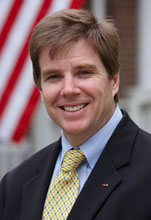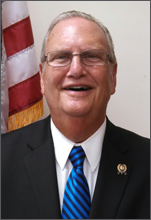A bill introduced in the New Jersey Legislature sets up a proxy fight between Gov. Chris Christie (R) and state Senate President Stephen  Sweeney (D) over the timing of when Garden State voters will be called upon to decide Atlantic City‘s fate. Sweeney wants to wait a year and Christie would prefer a November plebiscite. A bill — lacking important details like the tax rate — to authorize non-Boardwalk casinos has been put forward. The other potential loser in the bill, as presently written, would be Monmouth Park Racetrack, expressly ruled out as a casino site.
Sweeney (D) over the timing of when Garden State voters will be called upon to decide Atlantic City‘s fate. Sweeney wants to wait a year and Christie would prefer a November plebiscite. A bill — lacking important details like the tax rate — to authorize non-Boardwalk casinos has been put forward. The other potential loser in the bill, as presently written, would be Monmouth Park Racetrack, expressly ruled out as a casino site.
How you feel about the bill depends on what end of the state you represent. Assemblyman Chris Brown (R, below), whose constituency is Atlantic City, calls the legislation “a blow to hard- working middle-class families in Atlantic County and throughout the state. It makes absolutely no sense to expand gaming outside Atlantic City when every expert and analyst will tell you the market is already oversaturated.” (He’s got a point there.) Assemblyman Ralph Caputo (D), a co-sponsor who represents northerly Essex County, responds, “To survive in anything, you have to adapt. If you don’t adapt, you become extinct.”
working middle-class families in Atlantic County and throughout the state. It makes absolutely no sense to expand gaming outside Atlantic City when every expert and analyst will tell you the market is already oversaturated.” (He’s got a point there.) Assemblyman Ralph Caputo (D), a co-sponsor who represents northerly Essex County, responds, “To survive in anything, you have to adapt. If you don’t adapt, you become extinct.”
 No disrespect, Mr. Caputo (left), but there’s no danger of Atlantic City becoming “extinct,” except from your bill. The market has gone through an overdue correction and is stabilizing, but what will the effect on the Boardwalk be when megaresorts go up in “choke points” at the Meadowlands or Jersey City (which MGM Resorts International covets)? All you’re doing is, as Dover Downs President Ed Sutor said, “moving money around.”
No disrespect, Mr. Caputo (left), but there’s no danger of Atlantic City becoming “extinct,” except from your bill. The market has gone through an overdue correction and is stabilizing, but what will the effect on the Boardwalk be when megaresorts go up in “choke points” at the Meadowlands or Jersey City (which MGM Resorts International covets)? All you’re doing is, as Dover Downs President Ed Sutor said, “moving money around.”
* Yesterday, someone representing himself as a representative of Glenn Straub called to say that Straub & Co. were leaving Atlantic City in a  huff and would be selling Revel, fed up with local bureaucracy (Mayor Don Guardian excepted), Carl Icahn, Stockton University, ACR Energy Partners, an inability to purchase Bader Field, and what the source described as a culture of self-destruction and willingness to fail along the Boardwalk. When we last heard from Straub himself, he was making conciliatory noises toward Revel tenants, albeit proposing triple-net leases that were an offer you can refuse. As one of the tenants put it, why should they pay the same rates in winter, when business is slow, as during peak periods, when they could afford Straub’s proposed triple-net deal?
huff and would be selling Revel, fed up with local bureaucracy (Mayor Don Guardian excepted), Carl Icahn, Stockton University, ACR Energy Partners, an inability to purchase Bader Field, and what the source described as a culture of self-destruction and willingness to fail along the Boardwalk. When we last heard from Straub himself, he was making conciliatory noises toward Revel tenants, albeit proposing triple-net leases that were an offer you can refuse. As one of the tenants put it, why should they pay the same rates in winter, when business is slow, as during peak periods, when they could afford Straub’s proposed triple-net deal?
In any event, if Straub really has thrown in the towel on Revel (and  remarkably quickly, at that), it will mark the end of one the strangest sagas in Atlantic City … and this is saying a lot for a market that has seen its share of colorful operators, from brilliant ones like Icahn, Steve Wynn and Dennis Gomes to bumbling dilettantes like Donald Trump and Tom Barrack. I’m not sure under what category history will file Straub — if he is indeed history at this point.
remarkably quickly, at that), it will mark the end of one the strangest sagas in Atlantic City … and this is saying a lot for a market that has seen its share of colorful operators, from brilliant ones like Icahn, Steve Wynn and Dennis Gomes to bumbling dilettantes like Donald Trump and Tom Barrack. I’m not sure under what category history will file Straub — if he is indeed history at this point.
* Rather than go whole hog into Internet gambling, Pennsylvania solons could split the difference and legalize online poker. At least that’s state Sen. Sean Wiley‘s intent, although he hasn’t introduced his bill yet. His target date for inception of I-poker is Jan. 1, 2017 (after all,  there are regulations to be drafted and safeguards to be tested). As in New Jersey, the operation of the online poker rooms would be restricted to existing casinos, taxed at a steep 36%, plus a $500,000 licensing fee.
there are regulations to be drafted and safeguards to be tested). As in New Jersey, the operation of the online poker rooms would be restricted to existing casinos, taxed at a steep 36%, plus a $500,000 licensing fee.
For Wiley’s grand scheme to be realized, the Lege will also have to create a Casino Reinvestment Grant Fund, whereby some of those tax dollars would go back to the casinos for the purpose of capex maintenance. (‘Keep Pennsylvania Casinos Beautiful’?) Wiley’s ambitious scheme would also push out the date for new or renewed casino licenses to 2022, but would throw a big, juicy bone by repealing the ‘one and one-third’ ownership rule, opening the door to large-scale consolidation of the state’s casino industry.
That’s just the tip of the iceberg but it’s quite a lot all the same. What differentiates it from three other cyber-poker bills is that it isn’t a stand-alone provision but also addresses the terrestrial casino industry on a wide scale. We’ll see if it’s too big a mouthful for lawmakers to swallow.
* According to 17 player-friendly members of Congress, were the “IRS lockdown” on casino jackpots indexed to inflation, it would currently be at $4,700, not $1,200. Of course, that doesn’t matter to the IRS, which is currently fixated on grabbing a share of jackpots as low as $600 the moment they hit. If you don’t want to see your winnings evaporate, let your congressperson and senators know. It’s your money at stake.

